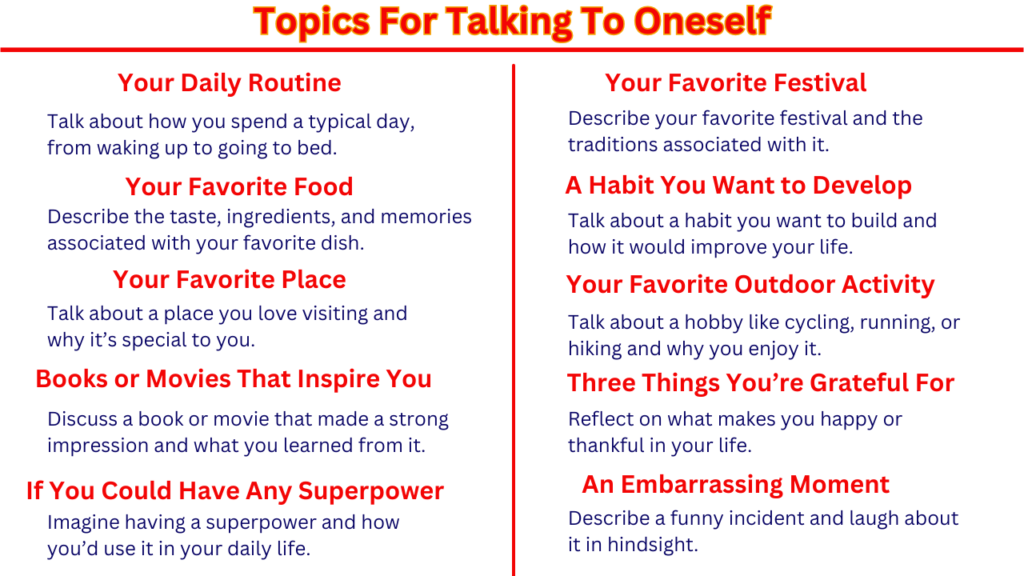Speak English Alone with Confidence: Proven Solo Practice Techniques

Practicing solo English speaking is an excellent way to enhance language skills and build confidence in communication. Although solo English speaking presents unique challenges, it also offers several significant benefits for mastering the language. A primary concern with solo English practice is the lack of immediate feedback. Without someone to correct your mistakes or offer suggestions, it can be challenging to gauge your progress. Additionally, staying motivated and disciplined can be difficult without external accountability.
However, solo English speaking practice can be very effective with the right mindset and techniques. Key to success are self-discipline and consistency. Setting clear, achievable goals, such as practicing for a set number of minutes each day or learning a certain number of new vocabulary words each week, can help maintain motivation and focus.
Solo English speaking practice also provides a unique learning experience, allowing you to concentrate on specific areas for improvement at your own pace, which is often difficult to achieve with a language partner. This method can complement other learning strategies, such as attending English classes, using language learning apps, or participating in online forums and communities.
Another major benefit of solo practice is the opportunity for self-reflection. Recording yourself and playing it back can help you identify areas needing improvement, such as pronunciation or grammar. This practice not only aids in self-assessment but also helps build confidence as you become more comfortable with your voice and speaking style.
In summary, while solo English speaking may require extra effort and creativity, it is a valuable and rewarding approach. By embracing its challenges and leveraging its benefits, you can make significant progress in your English speaking skills.
Effective Methods for Solo English Speaking Practice
Improving English speaking skills without a partner is absolutely possible through various effective techniques.
Talk to Yourself
One of the easiest ways to practice English speaking is by having self-conversations. You can do this anytime and anywhere, such as during your morning routine, cooking, or commuting.
Example
Pretend you are giving a presentation or explaining your day to a friend. Describe your actions and thoughts aloud in English. “Now I am making coffee. It’s such a beautiful day outside.”

Shadowing
Shadowing involves listening to a native speaker and mimicking what they say as closely as possible. This technique improves pronunciation, rhythm, and intonation. This practice helps in fine tuning accent and fluency.
Example
Find videos, podcasts, or audio books in English and practice shadowing. Mimic their speech patterns and try to match their tone and pace.
Recording oneself
It is another powerful approach. Recording your voice while speaking in English allows you to play back and analyze your pronunciation, intonation, and fluency. Start by reading a text aloud or speaking spontaneously on a topic while recording yourself, then listen to the recording. Note areas for improvement and re-record, focusing on those aspects. This process helps in self-assessment and continuous improvement.
Example

Choose a topic you’re interested in and record a short speech or record yourself reading some text. Listen to the recording and take notes on areas for improvement. Over time, you will observe yourself getting better.
Mirror Talk
Speaking in front of a mirror can boost your confidence. This technique allows you to observe your facial expressions and mouth movements, which are important aspects of communication.
Example
Choose a topic or use a prepared script, and practice solo English speaking while maintaining eye contact with your reflection. This could be introducing yourself, talking about your plans for the day, or summarizing a book you recently read. This not only improves English speaking skills but also boosts confidence in public speaking scenarios.
Storytelling and Retelling
Storytelling is an effective way to practice English and build confidence. Choose a simple tale or a personal experience, and try narrating it in English. For instance, you can tell the story of “The Lion and the Mouse” or a personal experience about a trip to a temple or a wedding. After narrating it, try retelling the same story in a more detailed or in a different way, adding new elements to enhance effectiveness.
This exercise not only improves vocabulary but also helps you develop creativity in storytelling, which is a key skill for speaking confidently. You can also try telling the story in different styles, such as in a formal tone or as if speaking to children.
Learn Phrases, not Just Words
Focusing on phrases rather than isolated words can make speaking more natural and fluent. This will help you retain the new vocabulary.
Example
Instead of learning the word “restaurant,” learn the phrase “I’d like to eat at a restaurant.” This method helps in constructing sentences easily during conversation.
Tools and Resources for Self-Study
Language Learning Apps
These language learning apps provide structured lessons and interactive exercises to practice speaking. Regular practice, on the apps, can help gain fluency.
Online Courses and Tutorials
These courses often include speaking assignments, video lectures, and peer reviews.
Speech Recognition Software
Tools like Google Voice Typing or Siri can help improve your pronunciation and fluency by responding to voice commands. These tools can help identify mispronunciations and suggest corrections, making it easier to adjust and improve. Consistent use of such software can significantly improve your English speaking abilities.
Audiobooks and Podcasts
Listening to audiobooks and podcasts improves your listening skills and exposes you to various speaking styles.
Pronunciation Tools
Some websites and apps specialize in helping learners with pronunciation.
Language Exchange Platforms
These platforms connect users with native speakers for language exchange, and many now offer features for self-practice. Use them to find conversation prompts and language challenges you can practice on your own.
English Speaking Clubs and Online Communities

Join online forums, social media groups, and virtual speaking clubs where you can practice speaking through video calls or voice notes.
Each of these methods provides distinct advantages. Incorporating them into your routine can significantly improve your English speaking skills and boost your confidence in using the language.
Creating a Sustainable Practice Routine
Establishing a sustainable practice routine is essential for improving your English speaking skills, particularly when practicing alone. The first step is to set realistic goals by identifying specific objectives, such as expanding your vocabulary, refining pronunciation, or enhancing fluency in conversation. Break these goals into smaller, manageable tasks, like learning five new words daily or practicing speaking on a particular topic for ten minutes each session.
Consistency is crucial, so schedule regular practice sessions. Dedicate specific time slots in your daily or weekly schedule exclusively for English practice, whether it’s 30 minutes each morning or an hour on weekends. Ensure these sessions are uninterrupted and focused, using tools like calendars or reminder apps to stay on track.
Tracking your progress can significantly boost motivation. Keep a journal or use an app to record what you’ve practiced, the new words or phrases you’ve learned, and any improvements you notice in your English conversation abilities. Regularly reviewing your progress will help you see your advancements and identify areas that need more attention.
Maintaining motivation can be challenging without immediate feedback. To overcome this, vary your practice methods to keep things interesting. Listen to English podcasts, watch English movies, or use language learning apps with interactive exercises. Also, practice for shorter duration. Celebrate small victories and milestones to keep a positive outlook.
Integrate English practice into your daily life by engaging in self-talk, describing your surroundings, or narrating your actions throughout the day. These small, consistent efforts can significantly enhance your English speaking skills over time. By balancing structured practice with enjoyable activities, you can sustain motivation and continue to improve your English speaking abilities effectively.
Frequently Asked Questions (FAQs)
1. What is solo English speaking and why is it useful?
Solo English speaking means practicing English conversation on your own—without a teacher or partner. It’s useful because it lets you speak freely, correct yourself, and build confidence in a private, stress-free environment. Many learners find it easier to start this way before joining real conversations
2. How can I practice English speaking alone at home?
If you’re wondering how to practice English speaking alone at home, start by talking about your daily routine, describing what you’re doing, or summarizing a movie you’ve watched. You can also record yourself speaking and listen back to notice pronunciation and grammar improvements.
3. What are the best ways to learn English speaking by yourself?
To learn English speaking by yourself, use a mix of listening and speaking practice. Watch English shows or YouTube videos, repeat after native speakers, and keep a short speaking journal. Use voice-recognition apps or AI tools to get instant pronunciation feedback.
4. How can I practice English speaking alone at home without a partner?
If you don’t have anyone to talk to, you can still practice English speaking alone at home without a partner by simulating real-life conversations. For example, pretend you’re ordering food, giving a presentation, or answering interview questions. The key is to speak out loud regularly.
5. What are 5 ways to practice English speaking alone effectively?
Here are 5 ways to practice English speaking alone every day:
- Mirror talk – speak while looking at yourself to build confidence.
- Voice recording – record short monologues and review them.
- Reading aloud – use books, articles, or dialogues to improve pronunciation.
- Shadowing – imitate native speakers’ tone and rhythm.
- Topic challenges – pick a random topic and speak for 2–3 minutes nonstop.
6. How can I practice speaking English by myself if I feel shy?
If you’re shy, practicing speaking English by yourself is actually the best solution. Start with whispering or reading aloud privately. Gradually increase your volume and confidence. Once you’re comfortable, record short clips or talk to AI chat partners to simulate real interaction.
7. How often should I do solo English speaking practice?
Daily practice—even for 10–15 minutes—makes a huge difference. Consistency matters more than duration. The more regularly you do English speaking practice alone, the faster your brain adapts to thinking and responding in English naturally.
8. Can solo English speaking really improve my fluency?
Yes, absolutely! When you practice English speaking alone, you train your brain to form sentences faster and think in English. Over time, this reduces hesitation and boosts fluency, making you sound more natural in real conversations.
9. What should I talk about while practicing alone?
You can talk about anything—your plans, dreams, favorite movies, or news updates. The idea is to speak continuously in English. Beginners can follow solo English speaking prompts or questions available online to keep their sessions structured and interesting.
10. How can I stay motivated to keep practicing English alone?
Set small, achievable goals—like recording one English monologue per day or completing a weekly fluency challenge. Track your progress and reward yourself for consistency. Remember, confidence grows when you keep showing up, even if it’s just you and your voice.
Conclusion
You can effectively engage is solo English practice using the right techniques and resources. Engage in self-talk, mirror exercises, recording yourself, shadowing, and learning new phrases to enhance your solo English practice. Make use of language learning apps, online courses, speech recognition software, audiobooks, podcasts, pronunciation tools, and join communities for a well-rounded self-study approach.
To make solo English speaking practice more engaging, try turning everyday activities into opportunities to speak English. Narrate your morning routine or describe what you see during your commute. You can also simulate conversations with imaginary partners, changing roles to practice both asking and answering questions. Consistent practice and a positive mindset are crucial for improving your English speaking skills. Set aside dedicated time each day to speak English. Enjoy the process and celebrate your progress along the way!
Ready to boost your confidence in speaking English? Start practicing solo with our expert tips today! Subscribe to our blog for more strategies and resources to help you become a fluent English speaker. Share your progress and challenges in the comments section below—we’d love to hear from you and support your journey!
Ready to boost your confidence in speaking English? Start practicing solo with our expert tips today! Follow our blog for more strategies and resources to help you become a fluent English speaker. Share your progress and challenges in the comments section —we’d love to hear from you and support your journey!
I create content to make English learning simple and practical. If you find it helpful, consider supporting me Your contribution helps me improve my skills and bring better content for you.




You revealed it very well!
casino en ligne
Nicely put. Kudos!
casino en ligne francais
Thanks a lot. Quite a lot of write ups!
casino en ligne
Fine tips Thank you.
casino en ligne
Great write ups, With thanks!
casino en ligne
Regards. Ample tips!
casino en ligne
Great stuff, Kudos.
casino en ligne fiable
You have made your position pretty clearly.!
casino en ligne France
Thank you, Plenty of advice!
casino en ligne
Thanks! I enjoy it.
meilleur casino en ligne
Thank you!
You have a gift for explaining things.
Thanks for your feedback!:)
This article is pure brilliance.
Thank you very much! I’m glad I could help you.
You’re a talented writer!
Thank you for your feedback!
Such a thoughtful article.
Thank you for your feedback!
I am often to blogging and i really appreciate your content. The article has really peaks my interest. I am going to bookmark your site and keep checking for new information.
I think you have noted some very interesting details , appreciate it for the post.